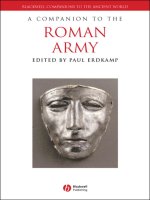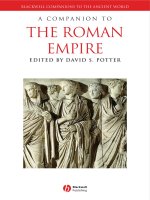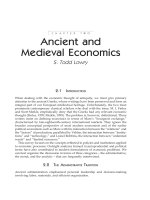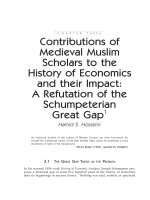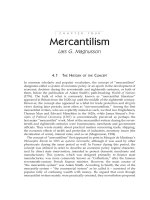a companion to the roman empire
Bạn đang xem bản rút gọn của tài liệu. Xem và tải ngay bản đầy đủ của tài liệu tại đây (4.93 MB, 715 trang )
BLACKWELL COMPANIONS TO THE ANCIENT WORLD
A COMPANION TO
THE ROMAN
EMPIRE
EDITED BY DAVID S. POTTER
A COMPANION
TO THE
ROMAN EMPIRE
BLACKWELL COMPANIONS TO THE ANCIENT WORLD
This series provides sophisticated and authoritative overviews of periods of ancient history, genres of
classical literature, and the most important themes in ancient culture. Each volume comprises between
twenty-five and forty concise essays written by individual scholars within their area of specialization. The
essays are written in a clear, provocative, and lively manner, designed for an international audience of
scholars, students, and general readers.
A
NCIENT HISTORY
Published
A Companion to the Roman Republic
Edited by Nathan Rosenstein and Rober t Morstein-
Marx
A Companion to the Roman Empire
Edited by David S. Potter
A Companion to the Classical Greek World
Edited by Konrad H. Kinzl
A Companion to the Ancient Near East
Edited by Daniel C. Snell
A Companion to the Hellenistic World
Edited by Andrew Erskine
In preparation
A Companion to Ancient History
Edited by Andrew Erskine
A Companion to the Archaic Greek World
Edited by Kurt A. Raaflaub and Hans van
Wees
A Companion to Julius Caesar
Edited by Miriam Griffin
A Companion to the Roman Army
Edited by Paul Erdkamp
A Companion to Byzantium
Edited by Elizabeth James
A Companion to Late Antiquity
Edited by Philip Rousseau
L
ITERATURE AND CULTURE
Published
A Companion to Ancient Epic
Edited by John Miles Foley
A Companion to Greek Tragedy
Edited by Justina Gregory
A Companion to Latin Literature
Edited by Stephen Harrison
In preparation
A Companion to Classical Mythology
Edited by Ken Dowden and Niall Livingstone
A Companion to Greek and Roman Historiography
Edited by John Marincola
A Companion to Greek Religion
Edited by Daniel Ogden
A Companion to Greek Rhetoric
Edited by Ian Worthington
A Companion to Roman Rhetoric
Edited by William Dominik and Jon Hall
A Companion to Classical Tradition
Edited by Craig Kallendorf
A Companion to Roman Religion
Edited by Jo
¨
rg Ru¨pke
A Companion to Ovid
Edited by Peter Knox
A Companion to Catullus
Edited by Marilyn Skinner
A COMPANION
TO THE
ROMAN EMPIRE
Edited by
David S. Potter
ß 2006 by Blackwell Publishing Ltd
BLACKWELL PUBLISHING
350 Main Street, Malden, MA 02148-5020, USA
9600 Garsington Road, Oxford OX4 2DQ, UK
550 Swanston Street, Carlton, Victoria 3053, Australia
The right of David S. Potter to be identified as the Author of the Editorial Material in this Work has been
asserted in accordance with the UK Copyright, Designs, and Patents Act 1988.
All rights reserved. No part of this publication may be reproduced, stored in a retrieval system, or
transmitted, in any form or by any means, electronic, mechanical, photocopying, recording or otherwise,
except as permitted by the UK Copyright, Designs, and Patents Act 1988, without the prior permission of
the publisher.
First published 2006 by Blackwell Publishing Ltd
1 2006
Library of Congress Cataloging-in-Publication Data
A companion to the Roman Empire / edited by David Potter.
p. cm. — (Blackwell companions to the ancient world. Ancient history)
Includes bibliographical references and index.
ISBN-13: 978-0-631-22644-4 (hard cover : alk. paper)
ISBN-10: 0-631-22644-3 (hard cover : alk. paper) 1. Rome—History—Empire, 30 B.C. –476 A.D. 2.
Rome—History—Empire, 30 B.C. –476 A.D.—Sources. 3. Rome—Civilization. I. Potter, D. S. (David
Stone), 1957– II. Series.
DG311.P68 2006
937’.06–dc22 2005015454
A catalogue record for this title is available from the British Library.
Set in 10/12pt Galliard
by SPI Publisher Services, Pondicherry, India.
Printed and bound in India
by Replika Press Pvt. Ltd, Kundli
The publisher’s policy is to use permanent paper from mills that operate a sustainable forestry policy, and
which has been manufactured from pulp processed using acid-free and elementary chlorine-free practices.
Furthermore, the publisher ensures that the text paper and cover board used have met acceptable
environmental accreditation standards.
For further information on
Blackwell Publishing, visit our website:
www.blackwellpublishing.com
For Claire and Natalie
Contents
List of Illustrations x
List of Tables xiii
Notes on Contributors xiv
Acknowledgments xvi
Reference works: Abbreviations xvii
Ancient authors: Abbreviations and Glossary xx
The Emperors of Rome from Augustus to Constantine xxix
Introduction: The Shape of Roman History: The Fate of the Governing Class 1
David S. Potter
PART ITHE SOURCES 21
1 Constructing a Narrative 23
Cynthia Damon
2 Roman Imperial Numismatics 35
William E. Metcalf
3 Documents 45
Traianos Gagos and David S. Potter
4 Art, Architecture, and Archaeology in the Roman Empire 75
Lea Stirling
5 Interdisciplinary Approaches 98
James B. Rives
PART II NARRATIVE 113
6 The Emergence of Monarchy: 44 BCE–96 CE 115
Greg Rowe
7 Rome the Superpower: 96–235
CE 126
Michael Peachin
8 The Transformation of the Empire: 235–337
CE 153
David S. Potter
PART III ADMINISTRATION 175
9 The Administration of the Provinces 177
Clifford Ando
10 The Transformation of Government under Diocletian and
Constantine 193
Hugh Elton
11 The Roman Army 206
Nigel Pollard
12 Greek Cities Under Roman Rule 228
Maud W. Gleason
13 Cities and Urban Life in the Western Provinces of the
Roman Empire 30
BCE–250 CE 250
Jonathan Edmondson
PART IV SOCIAL AND ECONOMIC LIFE 281
14 The Imperial Economy 283
David Mattingly
15 Landlords and Tenants 298
Dennis P. Kehoe
16 The Family 312
Judith Evans Grubbs
17 Sexuality in the Roman Empire 327
Amy Richlin
18 On Food and the Body 354
Veronika E. Grimm
19 Leisure 369
Garrett G. Fagan
20 Spectacle 385
David S. Potter
viii Contents
PART VINTELLECTUAL LIFE 409
21 The Construction of the Past in the Roman Empire 411
Rowland Smith
22 Imperial Poetry 439
K. Sara Myers
23 Greek Fiction 453
Joseph L. Rife
24 Roman Law and Roman History 477
John Matthews
25 Roman Medicine 492
Ann Hanson
26 Philosophy in the Roman Empire 524
Sara Ahbel-Rappe
PART VI RELIGION 541
27 Traditional Cult 543
David Frankfurter
28 Jews and Judaism 70–429
CE 565
Yaron Z. Eliav
29 Christians in the Roman Empire in the First Three
Centuries
CE 587
Paula Fredriksen
30 Christian Thought 607
Mark Edwards
Bibliography 620
Index 681
Contents ix
Illustrations
Maps
1 Provinces of the Roman Empire at the death of Trajan (
AD 117) xxxi
2 Dioceses and provinces of the Roman Empire according to the
Verona List (c.
AD 303–324) 172
Figures
2.1 ‘‘Crocodile’’ as from Nı
ˆ
mes 39
2.2 Aureus of Octavian 28
BCE 43
4.1 Portrait of Livia, wife of Augustus 78
4.2 Roman forum at Chemtou, with foundations of Numidian
tombs exposed at the center 81
4.3 The Colosseum at Rome 82
4.4 Statue of Artemis at the Hunt next to a wall painting of a
muse in apartment 4 of Terrace House 2, Ephesos 87
4.5 Infant buried in amphora at Leptiminus (Tunisia) 90
4.6a Statuette of the weary Hercules discovering son Telephos,
found in a late-antique suburban villa at Corinth 95
4.6b Colossal statue of the Weary Hercules found in the
Baths of Caracalla, Rome 96
6.1a–e The Julio-Claudian house: (a) Augustus; (b) Tiberius;
(c) Caligula; (d) Claudius; (e) Nero 119
6.2a and b The propaganda of the Galban revolution 124
6.3a–c The Flavians: (a) Vespasian; (b) Titus; (c) Domitian 125
7.1a–f The Antonines: (a) Nerva; (b) Trajan; (c) Hadrian;
(d) Antoninus Pius; (e) Marcus Aurelius; (f ) Commodus 134
7.2a–d The Severans: (a) Septimius Severus; (b) Caracalla;
(c) Elagabalus; (d) Alexander 142
8.1a–j Sapor and his enemies. (a) Sapor I; (b) Gordian III;
(c) Philip I; d) Decius; (e) Trebonianus Gallus;
(f) Aemilianus; (g) Valerian; (h) Gallienus;
(i) Claudius II; (j) Aurelian 159
10.1a–d The tetrarchs: (a) Diocletian; (b) Maximian;
(c) Constantius I; (d) Galerius 195
12.1a The entrance to the agora at Ephesus 236
12.1b The marble street at Ephesus 236
12.2a The theater at Ephesus 238
12.2b Tetrapylon at Aphrodisias 238
13.1a and b Relief from Avezzano, Italy, showing city and surrounding
countryside 252
13.2a and b Colonia Augusta Emerita (Me
´
rida, Spain): (a) plan of the
city and environs; (b) reconstruction of the
monumental center 262–3
13.3a and b Forum adiectum, Emerita: (a) general view;
(b) reconstruction of R. Mesa 264–5
13.4 Reconstruction of statue-group of Aeneas (center),
Ascanius (left), and Anchises (right) from the
forum adiectum, Emerita 266
13.5 Colonia Iulia Urbs Triumphalis Tarraco 266
13.6 Glanum: plan of the Roman forum and twin temples,
surrounded by U-shaped portico 267
13.7a and b Conimbriga: Forum (a) in Augustan period and
(b) as later remodeled after Flavian grant of the ius Latii 268
13.8a and b Cities remodeled by emperors: (a) Italica; (b) Lepcis Magna 270–1
19.1a Ostia, tavern on the Via di Diana, exterior view 374
19.1b Ostia, tavern on the Via di Diana, interior view 374
19.2a Suburban baths, Pompeii 380
19.2b Suburban baths, Herculaneum 380
25.1a Relief of Scribonia Attice assisting with a birth 504
Illustrations xi
25.1b Relief of Marcus Ulpius Amerimnus drawing blood 504
25.2 An okytokia, or ‘‘quick birth’’ amulet 518–19
28.1a Mosaic ‘‘carpet’’ from the fourth-century synagogue
at H
˙
amat Tiberieas 569
28.1b The interior of a fourth-century synagogue at Sardis 570
28.2a Imperial celebration of the capture of Jerusalem is
reflected in the issue of Judaea Capta coinage under
Vespasian 572
28.2b Coin of Caesarea 572
28.3 An Aramaic letter written on papyrus from the so called
‘‘Cave of the Letters’’ at the Judaean Desert 575
xii Illustrations
Tables
1.1 Coverage of Roman history by historians 25
3.1 The bureaucracy of Roman Egypt 65
7.1 Emperors,
AD 96–235 130
7.2 Nerva, Trajan, Hadrian, and Lucius Verus 132
7.3 Antoninus Pius, Marcus Aurelius, Commodus 133
7.4 The Severan emperors 137
11.1 The deployment of the legions in the principate 210
23.1 Timeline of Greek fiction under the Roman Empire 454
26.1 Names and dates of important philosophers 526
Notes on Contributors
Sara Ahbel-Rappe is Associate Professor
of Greek and Latin in the Department of
Classical Studies at the University of
Michigan.
Clifford Ando is Associate Professor in
the Classics Department at the Univer-
sity of Southern California.
Cynthia Damon is Associate Professor
in the Classics Department at Amherst
College.
Jonathan Edmondson is Associate Pro-
fessor in the Department of History at
York University.
Mark Edwards is Lecturer in Patristics
at the University of Oxford and Student
of Christ Church.
Yaron Z. Eliav is Jean and Samuel
Frankel Assistant Professor of Rabbinic
Literature and Jewish History of Late
Antiquity in the Department of Near East-
ern Studies at the University of Michigan.
Hugh Elton is Director of the British
Institute at Ankara.
Garrett G. Fagan is Associate Professor
of Classics and Ancient Mediterranean
Studies and History at Pennsylvania
State University.
David Frankfurter is Professor of His-
tory and Religious Studies in the Depart-
ment of History at the University of New
Hampshire.
Paula Fredriksen is William Goodwin
Aurelio Professor of the Appreciation of
Scripture, Social and Intellectual History
of Early Christianity in the Department
of Religion at Boston University.
Judith Evans Grubbs is Professor of
Classics in the Department of Classics at
Washington University in St. Louis.
Traianos Gagos is Associate Professor of
Papyrology and Greek in the Depart-
ment of Classical Studies, and Archivist
in the Papyrology Collection at the
University of Michigan.
Maud W. Gleason is Lecturer in Classics
in the Department of Classics at Stanford
University.
Veronika E. Grimm is Lecturer in the
Department of Classics at Yale University.
Ann Hanson is Senior Research Scholar/
Senior Lector in the Department of
Classics at Yale University.
Dennis P. Kehoe is Professor of Classics
in the Department of Classics at Tulane
University.
John Matthews is John M. Schiff Pro-
fessor of History and Classics in the De-
partment of Classics at Yale University.
David Mattingly is Professor of Roman
Archaeology in the School of Archae-
ology and Ancient History at the Univer-
sity of Leicester.
William E. Metcalf is Adjunct Professor
in the Department of Classics and
Curator of Coins and Medals, Yale
University Art Gallery, at Yale University.
K. Sara Myers is Associate Professor of
Classics in the Department of Classics at
the University of Virginia.
Michael Peachin is Professor of Classics
in the Department of Classics at New
York University.
Nigel Pollard is Lecturer in the Faculty
of Classics and Ancient History at the
University of Swansea.
David S. Potter is Professor of Greek
and Latin in the Department of Classical
Studies at the University of Michigan.
Amy Richlin is Professor of Classics in
the Department of Classics at UCLA.
Joseph L. Rife is Assistant Professor of
Classics in the Department of Classics at
Macalester College.
James B. Rives is Associate Professor in
the Program in Classical Studies at York
University.
Greg Rowe is Associate Professor in the
Department of Greek and Roman Stud-
ies at the University of Victoria.
Lea Stirling is Canada Research Chair in
Roman Archaeology in the Department
of Classics at the University of Manitoba.
Rowland Smith is Lecturer in the
School of Historical Studies at the
University of Newcastle upon Tyne.
Notes on Contributors xv
Acknowledgments
It is a pleasure to thank the many people who made this volume possible. First and
foremost my gratitude to the diverse contributors is enormous. I have learned a very
great deal from them, and owe them all many thanks, especially those who turned in
their chapters as long ago as 2001, for the extreme patience that they have shown in
the long process of completion. I can only hope that they will think that the final
product has been worth the wait.
For help in the final preparation of this book, I would first like to thank my chairman,
Richard Janko, and my colleagues in the Department of Classical Studies for releasing
the substantial research funds that enabled me to collect many of the illustrations that
appear here, and to pay for the enormous help provided by my two assistants. Professor
Kendra Eshleman brought order to the manuscript after completing her dissertation in
the summer of 2004, and prepared the list of Classical authors. In the winter of 2005,
Robert Chenault assisted mightily with the final preparation of the manuscript in every
area, taking on responsibilities that went well beyond what I could have reasonably
expected to enormously improve the accuracy of the volume. I also want to thank
Professor Yaron Eliav for his assistance with the non-Classical texts that are quoted in
this volume. I am responsible for any and all errors that remain.
I am also very grateful to Al Bertrand at Blackwell, firstly for thinking of me as the
editor of this volume, and secondly for the gentle, patient encouragement that he has
provided in the long process of getting it ready to go to press. In addition, I am grateful
to Louise Spencely, who saw the book through its final stages before publication.
The greatest debt that I owe is, as always, to my family, to my wife Ellen, and to our
daughters, Claire and Natalie, who brighten every hour of our lives. The pleasure that
Claire and Natalie take in seeing the typescript leave the house (and their hope that
they will hear less about the $%#$«$ Romans in the future) makes it only right to
dedicate this book to them.
David S. Potter, 2006
Reference Works: Abbreviations
ABD Anchor Bible Dictionary
Acts of the
Ecumenical
Councils J. Harduin. Acta Conciliorum. 4 vols. Paris. 1714–15
AE L’Anne
´
ee
´
pigraphique, published in Revue Arche
´
ologique and separately.
1888–
AJA American Jour nal of Archaeology
AJAH American Journal of Ancient History
AJN American Journal of Numismatics
AJP American Journal of Philology
AnalRom Analecta Romana
ANRW Aufstieg und Niedergang der ro¨mischen Welt. Berlin. 1972–
ANSMN Museum Notes (American Numismatic Society)
Ant. Afr. Antiquite
´
s Africaines
ASP American Studies in Papyrology
BASP Bulletin of the American Society of Papyrologists
BCH Bulletin de correspondance helle
´
nique
BE Bulletin e
´
pigraphique, published in REG
BGU Berliner Griechische Urkunden (A
¨
gyptische Urkunden aus den Kgl. Museen zu
Berlin)
BICS Bulletin of the Institute for Classical Studies
CA Classical Antiquity
CAH
2
Cambridge Ancient History.2
nd
edn. 1961–
CEFR Collection de l’E
´
cole franc¸aise de Rome. 1976–
CIL Corpus Inscriptionum Latinarum. 1863–
CIS Corpus Inscriptionum Semiticarum. 1881–
C.Pap.Jud. Corpus Papyrorum Judaicarum. 1957–64
CPh Classical Philology
CQ Classical Quarterly
CRAI Comptes rendues de l’Acade
´
mie des Inscriptions et Belles-lettres
CW Classical World
EchCl Echos du monde classique/Classical Views
EJ V. Ehrenberg and A. H. M. Jones. Documents Illustrating the Reigns of
Augustus and Tiberius.2
nd
edn. 1976
FIRA S. Riccobono. Fontes Iuris Romani AnteIustiniani. 1941
FIRA
7
Bruns, K. G. Fontes Iuris Romani Antiqui (7
th
edn. by O. Gradenwitz).
1909
FHG C. Mu¨ller. Fragmenta Historicorum Graecorum. 1841–70
FGrH F. Jacoby. Die Fragmente der griechischen Historiker. 1923–
GRBS Greek, Roman and Byzantine Studies
HAE Hispania Antiqua Epigraphica
HSCP Harvard Studies in Classical Philology
HTR Harvard Theological Review
I. Ephesus H. Wankel, R. Merkelback, et al., eds. Die Inscriften von Ephesos. 1979–81
IAM Inscriptions antiques du Maroc
IG Inscriptiones Graecae. 1873–
IGLS Inscriptions grecques et latines de la Syrie
IGRR R. Cagnat. Inscriptiones Graecae ad Res Romanas Pertinentes. Paris. 1906–
27
ILA Inscriptions latines d’Aquitaine
ILAfr Inscriptions latines d’Afrique
ILCV Inscriptiones Latinae Christianae Veterae
ILS H. Dessau. Inscriptiones Latinae Selectae. Berlin. 1892–1916.
Inscr. It. Inscriptiones Italiae
IRC G. Fabre, M. Mayer, and I. Roda
`
. Inscriptions romaines de Catalogne. Paris.
1984–2002
IRT J. M. Reynolds and J. B. Ward-Perkins. The Inscriptions of Roman Tripoli-
tania. Rome. 1952
JARCE Journal of the American Research Center in Egypt
JECS Journal of Early Christian Studies
JHS Journal of Hellenic Studies
JNG Jahrbuch fu¨r Numismatik und Geldgeschichte
JRA Journal of Roman Archaeology
JRS Journal of Roman Studies
JTS Journal of Theological Studies
LR
3
N. Lewis and M. Reinhold. Roman Civilization: Selected Readings.3
rd
edn.
New York and Oxford. 1990
LTUR E. M. Steinby, ed. Lexicon Topographicum Urbis Romae. 6 vols. Rome.
1992–2002
MAMA Monumenta Asiae Minoris Antiquae. 1928–
MEFRA Me
´
langes de l’E
´
cole Franc¸aise de Rome
NC Numismatic Chronicle
NPNF Nicene and Post-Nicene Fathers
P.Amh. B. P. Grenfell and A. S. Hunt, eds. Amherst Papyri. London. 1900–1
Pap.Brux. Papyrologica Bruxellensia. Brussels. 1962–
P.Fam.Tebt. B. A. van Groningen. A Family Archive from Tebtunis. Pap.Lugd.Bat. VI.
Leiden. 1950
P.Panop.Beatty T. C. Skeat. Papyri from Panopolis in the Chester Beatty Library Dublin.
Chester Beatty Monographs I. Dublin. 1964
P.Bostra J. Gascou. Unite
´
s administratives locales et fonctionnaires romains. In Eck
and Mu¨ller-Luckner 1999: 61–73
P.Cair. Isid. A. E. R. Boak and H. C. Youtie, eds. The Archive of Aurelius Isidorus in the
Egyptian Museum, Cairo, and the University of Michigan
P.Dura C. B. Welles et al., eds. The Excavations at Dura-Europos conducted by Yale
University and the French Academy of Inscriptions and Letters. Final Report 5
pt. 1: The Parchments and Papyri. 1959
P.Euphr. D. Feissel and J. Gascou. Documents d’archives romains ine
´
dits du Moyen
Euphrate (III
e
s. apre
`
s J.C.). Journal des Savants: 65–119. 1995
xviii Reference Works: Abbreviations
P.Gen.Lat. J. Nicole and C. Morel, eds. Archives militaires du 1
er
sie
`
cle (Texte ine
´
dit du
Papyrus Latin de Gene
`
ve No. 1). Geneva. 1900
P.Lond. Greek Papyri in the British Museum. London. 1893–
P.Mich. Michigan Papyri. 1931–
P.Oxy. The Oxyrhynchus Papyri . London. 1898–
P.Thmouis I S. Kambitsis. Le Papyrus Thmouis I, colonnes 68–160. Paris. 1985
P.Yadin N. Lewis, Y. Yadin, and J. Greenfield. The Documents from the Bar Kochba
Period in the Cave of Letters. Jerusalem. 1989–2002
P.Yale I J. F. Oates, A. E. Samuel, and C. B. Welles. Yale Papyri in the Beinecke Rare
Book and Manuscript Library. ASP 2. New Haven and Toronto. 1967
PBSR Papers of the British School at Rome
PCPS Proceedings of the Cambridge Philological Society
PG Migne. Patrologia Graeca
PGM K. Preisendanz, ed. Papyri Graecae Magicae. Leipzig-Berlin. 1928–31.
(Trans. H. D. Betz, The Magical Papyri in Translation. Chicago. 1985.)
PSI Papiri Greci e Latini, Pubblicazioni della Societa
`
italiana per la ricerca dei
papiri greci e latini in Egitto. 1912–
RDGE R. K. Sherk. Roman Documents from the Greek East: Senatus Consulta and
Epistulae to the Age of Augustus. Baltimore. 1969
RA Revue arche
´
ologique
REA Revue des e
´
tudes anciennes
REG Revue des e
´
tudes grecques
RIB R. G. Collingwood, R. P. Wright, et. al. The Roman Inscriptions of Britain.
1965–
RIC Roman Imperial Coinage
RIN Rivista italiana di numismatica e scienze affini
RIT G. Alfo
¨
ldy. Die ro¨mischen Inschriften von Tarraco. Berlin. 1975
RN Revue numismatique
RPC Roman Provincial Coinage
RS M. H. Crawford. Roman Statutes. BICS Suppl. 64. London. 1996
SB F. Preisigke et al. Sammelbuch griechischen Urkunden aus A
¨
gypten. 1915–
SCI Scripta Classica Israelica
SEG Supplementum Epigraphicum Graecum. 1923–
Sel. Pap. A. S. Hunt, C. C. Edgar, and D. L. Page. Select Papyri. 4 vols. Cambridge,
MA. 1950
SIG
3
W. Dittenberger. Sylloge Inscriptionum Graecarum.3
rd
edn. Leipzig. 1915–
24
SNR Schweizerische Numismatische Rundschau ¼ Revue suisse de numismatique
Tab. Vindol. A. K. Bowman and J. D. Thomas, eds. Vindolanda: the Latin Writing
Tablets. 1983–2003
TrGF B. Snell, R. Kannicht, and S. Radt, eds. Tragicorum Graecorum Fragmenta.
4 vols. 1971–85; vol. 1
2
1986
TSAJ Texte und Studien zum Antiken Judentum
VC Vigiliae Christianae
YCS Yale Classical Studies
ZPE Zeitschrift fu¨r Papyrologie und Epigraphik
ZSS Zeitschrift der Savigny-Stiftung fu¨r Rechtsgeschichte
Reference Works: Abbreviations xix
Ancient Authors:
Abbreviations and Glossary
A. Paul. et Thecl. Acts of Paul and Thecla
A. Pion. Acts of Pionius
Ach. Tat. Achilles Tatius, Alexandrian novelist, 2nd c.
CE, Leucippe and Cleito-
phon
Ael. Aelian, Latin writer, c.165/70–230/5
CE, Letters
Alciphr. Alciphron, Greek sophist, 2nd/3rd c.
CE, Letters
Alex. Aphr. Alexander of Aphrodisias, Aristotelian philosopher, late 2nd c.
CE
Amm. Marc. Ammianus Marcellinus, Latin historian, 4th c. CE, History
Antyllus in Orib. Coll. (see Oribasius of Pergamum, Collectiones medicae)
AP Anthologia Palatina (Greek Anthology)
Apicius Apicius, author of (undated) handbook On Cooking
Apophth. Patr. Apophthegmata Patrum (Sayings of the Desert Fathers)
App., BC Appian, Greek historian, 2nd c.
CE, Bella Civilia (Civil Wars)
Apul. Apuleius of Madaura, Latin prose writer, 2nd c.
CE
Met. Metamorphoses,orThe Golden Ass
Aristid., Or. Aelius Aristides, Greek orator, 2nd c.
CE, Orations
Arr. Arrian, Greek historian, c.86–160
CE
Alan. Expeditio contra Alanos (Order of Battle against the Alans)
Anab. Anabasis
Epict. Discourses of Epictetus
Artem. Artemidorus Daldianus, author of a work on the dream interpret-
ation, 2nd c.
CE, Oneirocritica (The Interpretation of Dreams)
Ath., Deip. Athenaeus, 3rd c.
CE, Deipnosophistae (Doctors at Dinner)
Ath., V. Ant. Athanasius, bishop of Alexandria, 4th c.
CE, Life of Saint Antony
August. Augustine of Hippo, bishop and writer, 354–430
CE
Conf. Confessions
De Trin. De Trinitate (On the Trinity)
Serm. Sermons
Aur. Vict., Caes. Aurelius Victor, Latin historian, 4th c.
CE, de Caesaribus (Book on the
Emperors)
Auson. D. Ausonius Magnus, statesman, teacher and writer, 4th c.
CE
Ep. Epigrams
Mos. Mosella
Barn. Letter of Barnabas
Basil, Ep. Basil, bishop of Caesarea in Cappadocia, 329–79
CE, Letters
Caes. C. Julius Caesar, 100–44
BCE
BC Bellum Civile (Civil War)
BG de Bello Gallico (Gallic War)
[Caes.] B. Afr. Bellum Africum (African War)
Cato, Agr. Cato the Elder, Roman politician and writer, 234–149
BCE, On
Agriculture
Celsus, Med. A. Cornelius Celsus, 1st c.
CE, Concerning Medicine
Char. Chariton, Greek novelist, before mid-2nd c.
CE, Chaereas and Cal-
lirhoe¨
Chron. Pasc. Chronicon Paschale (Easter Chronicle), universal history from Cre-
ation to c.630
CE
Cic. M. Tullius Cicero, Roman politician and writer, 106–43 BCE
Ac. Academica
Att. Letters to Atticus
Brut. Brutus
Cael. On Behalf of Caelius
de Orat. de Oratore
Div. On Divination
Fam. Letters to Friends
Fin. de Finibus Bonorum et Malorum
Flac. On Behalf of Flaccus
Font. On Behalf of Fonteius
Leg. de Legibus (On Laws)
Mur. On Behalf of Murena
Off. de Officiis (On Duties)
Orat. Orator
Phil. Philippics
Pis. Against Piso
Q. fr. Letters to Quintus
Rep. Republic
Rull. Against Rullus
Tusc. Tusculan Disputations
Ver. Against Verres
Col., Rust. Columella, 1st c.
CE, de Re Rustica, an agricultural manual
Copa The Proprietress, poem ascribed to Vergil
1–2 Cor First and Second Letters to the Corinthians
CJust. Code of Justinian
CTh. Code of Theodosius II
Cyril, Ep. Cyril, bishop of Alexandria, 5
th
c. CE, Letters
D. Digest of Justinian
Dn Daniel
D.Chr. Dio Chrysostom, Greek orator and philosopher, mid-1st c.–early 2nd
c.
CE
Dict. Cret. Dictys of Crete, supposed companion of Idomeneus at Troy, alleged
author of the Memoirs of the Trojan War
D.L. Diogenes Laertius, Greek biographer, 3rd c.
CE, De clarorum philo-
sophorum vitis (Concerning the Lives of Famous Philosophers)
Dio Cassius Dio, Greek historian of Rome, c.164–after 229
CE, Roman
History
Enn. Ennius, Latin poet, 239–169
BCE
Ep. Aristeas Letter of Aristeas, 2nd c.
BCE
Epict. Epictetus, Stoic philosopher, mid-1st–2nd c.
CE
Ench. Encheiridion (Handbook)
Epitome Epitome on the Emperors, anon. history of Rome, 4th c.
CE
Ancient Authors: Abbreviations and Glossary xxi
Eun., VS Eunapius, Greek sophist and historian, 4th c. CE, Vitae Sophistarum
(Lives of the Sophists)
Eur. Euripides, Athenian tragedian, c.480s–407/6
BCE
Hec. Hecuba
Tr. Trojan Women
Euseb. Eusebius of Caesarea, bishop and scholar, c.260–339
CE
Eccl. Hist. Ecclesiastical History
Hierocl. Against Hierocles
LC de Laudibus Constantini (In Praise of Constantine)
Mart. Pal. Martyrs of Palestine
VC Vita Constantini (Life of Constantine)
Eust., Comm. Od. Eustathius, bishop and scholar, 12th c.
CE, Commentary on the
Odyssey
Eutrop. Eutropius, Latin historian, 4th c.
CE, Abbreviated History of Rome
Ex Exodus
Festus Festus, Latin historian, 4th c.
CE, Abbreviated History
Florus L. Annaeus Florus, Latin historian, 2nd. c.
CE, Epitome of Seven
Hundred Years’ Worth of Wars
Fron. S. Julius Frontinus, Roman politician and writer, d. 103/4
CE
Aq. On Aqueducts
Str. Strategemata
Fronto M. Cornelius Fronto, orator and tutor of Marcus Aurelius, c.95–
c.166
CE (the letters are referred to in the ordering of M. Van den
Hout, M. Cornelii Frontonis Epistulae [Leiden, 1954])
Ant. Letters to Antoninus Pius
Aur. Letters to Marcus Aurelius
Ep. Add. Appendix of Letters without Addresses
Prin. hist. Principia historiae
Gaius, Inst. Gaius, Roman jurist, 2nd c.
CE, Institutes
Gal Letter to the Galatians
Galen Galen, Greek medical writer, 2nd c.
CE
Anat. admin. On Anatomical Procedures
Antid. On Antidotes
Caus. puls. On Causes of Pulses
Comp. med. per gen. On Compound Drugs by Type
Diff. puls. On Differences in Pulses
Diff. resp. On Difficult Breathing
Examin. Examinations of the Best Physicians
Hipp. Fract. comment. Commentary to the Hippocratic ‘‘Fractures’’
Introd. [Galen], Introduction [to Medicine] or the Doctor
Libr. Propr. On his Own Books
Loc. affect. On the Affected Parts
Meth. med. Methods of Healing
Mor. Habits; J. N. Mattock, ed., ‘‘A Translation of the Arabic of Galen’s
Book Peri e
ˆ
tho
ˆ
n’’ in S. M. Stern et al., editors, Islamic Philosophy and
The Classical Tradition (Festschrift R. Walzer), Columbia, SC: 1972.
235–60
Nat. fac. On Natural Faculties
Praecog. Prognosis
Puls. diff. On Differences in Pulses
Sanit. Hygiene
Sem. On Generating Seed
Simpl. med. temp. On the Powers of Simples
Ther. ad Pis. On Theriacs, dedicated to Piso
Usu puls. On Usefulness of the Pulse
xxii Ancient Authors: Abbreviations and Glossary
Gel. Aulus Gellius, Roman miscellanist, 2nd c. CE, Attic Nights
Greg. Naz. Ep. Gregory, c.325–389
CE, bishop of Nazianzus, Letters
HA Historia Augusta, anon. collection of imperial biographies, 4th or
5th c.
CE
Ant. Pius Life of Antoninus Pius
Avid. Cass. Life of Avidius Cassius
Carac. Life of Caracalla
Claud. Life of Claudius II
Comm. Life of Commodus
Did. Jul. Life of Didius Julianus
Had. Life of Hadrian
Heliogab. Life of Elagabalus
Marc. Life of Marcus Aurelius
Pert. Life of Pertinax
Sev. Life of Septimius Severus
Hdt. Herodotus of Halicarnassus, Greek historian, 5th c.
BCE
Heb Letter to the Hebrews
Heliod. Heliodorus, Greek novelist, probably fl. c.230
CE, The Ethiopian
Story of Theagenes and Charicleia
Hermog., Prog. Hermogenes, Greek rhetorical writer, 2nd c.
CE, Progymnasmata
(Preliminary Exercises)
Herod. Herodian, Greek historian, 3rd c.
CE, History of the Empire from the
Time of Marcus
Hipp., Ref. Hippolytus of Rome, Christian apologist, fl. c.180–238
CE, Refuta-
tion of all Heresies.
Hippoc. Hippocrates of Cos, Greek medical writer, 5th c.
BCE
Art De Articulis (On Joints)
Epid. Epidemiae (Epidemics)
Morb. mul. De morbis mulierum (On the Diseases of Women)
Nat. puer De natura pueri (On the Nature of the Child)
Hom. Homer
Il. Iliad
Od. Odyssey
Hor. Q. Horatius Flaccus, Latin poet, 65–8
BCE
Ars Ars Poetica
Sat. Satires
Hyginus author of a treatise on categories of land and land disputes, c.100
CE,
On Establishing Boundaries
Iamb. Iamblichus, Neoplatonist philosopher, c.245–c.325
CE
Myst. On the Mysteries of the Egyptians
Prot. Protrepticus (Exhortation to Philosophy)
VP Vita Pythagorica (Life of Pythagoras)
Iamb., Bab. Iamblichus, Greek novelist, fl. c.165–80
CE, The Babylonian History
Ign., Ignatius of Antioch, Christian theologian, fl. c.100
CE
Eph. Letter to the Ephesians
Mg. Letter to the Magnesians
Phld. Letter to the Philadelphians
Sm. Letter to the Smyrnaeans
Tr. Letter to the Trallians
Iren., AH Irenaeus of Lyons, bishop and heresiologist, c.130– c.202
CE,
Against Heresies
Jas Letter of James
Jer. Jerome, Christian scholar and ascetic, c.347–420
CE
Chron. Chronicle
Ep. Letters
V.Paul Life of Paul
Ancient Authors: Abbreviations and Glossary xxiii
Jn. Gospel according to John
Jo.Chr. John Chrysostom, bishop, c.354–407
CE, de Studio praesentium (On
the Zeal of those Present)
Jos. Flavius Josephus, Jewish historian, 37–c.100
CE
AJ Jewish Antiquities
BJ Bellum Judaicum (Jewish War)
Jul. Julian ‘‘the Apostate,’’ emperor 361–3
CE
Caes. Caesars
Ep. Letters
Julian Salvius Julianus, Roman jurist, 2nd c.
CE
Justin Justin Martyr, Christian teacher and apologist, c.100–65 CE
Trypho Dialogue with Trypho
1 Apol. First Apology
2 Apol. Second Apology
Juv., Sat. Juvenal, Latin poet, 1st–2nd c.
CE, Satires
Lact., DMP Lactantius, Christian apologist, c.240–c.320
CE, de Mortibus Persecu-
torum (On the Deaths of the Persecutors)
Largus Scribonius Largus, c.1–50
CE, Compositiones
Laudatio Laudatio Turiae (In Praise of ‘‘Turia’’)
Lex Irnitana Municipal Law for Irni in Spain (J. Gonza
´
lez, JRS 76 [1986])
Lex de Provinciis
Praetoriis Law on the praetorian provinces of 100
BCE (M. H. Crawford,
Roman Statutes no. 12)
Lex Ursonensis Lex coloniae Genetivae Iuliae (Municipal code for Urso in Spain,
M. H. Crawford, Roman Statutes no. 25)
Lib., Or. Libanius, Greek rhetorician, 314–c.393
CE, Orations
Livy Livy, Latin historian, probably 59
BCE–17 CE; Ab Urbe Condita
(From the Foundation of the City)
Per. Periochae (Summaries)
Lk Gospel according to Luke
Long. Longus, Greek novelist, late 2nd or early 3rd c.
CE, Daphnis and
Chloe
Luc. Lucian of Samosata, Greek prose writer, b. c.120
CE
Alex. Alexander the False Prophet
Amatores The Lovers
Apol. Apologia (Defense)
Peregr. De morte Peregrini
Gall. Gallus (The Rooster)
Hist. Conscr. Quomodo historia conscribenda sit (How to Write History)
Imag. Images
Laps. de Lapsu inter salutandum (Concerning a Slip)
Nav. Navigium (The Ship)
Pr.Im. pro Imaginibus (Concerning Images)
Rh. Pr. Rhetorum praeceptor (Teacher of Orators)
Salt. de Saltatione (About Dancing)
Syr. D. de Syria Dea (On the Syrian Goddess)
Ver. Hist. Verae Historiae (True Histories)
Lucil. Lucilius, Latin satirist, probably c.180–102/1
BCE
M. Pol. Martyrdom of Polycarp
Mc Maccabees
Malal. John Malalas, Greek historian, c.490–570s
CE, Chronicle
Macrob. Macrobius, Roman politician and scholar, 5th c.
CE
In Somn. Commentary on the Dream of Scipio
Sat. Saturnalia
Marc. Aurel. Marcus Aurelius, Roman emperor 161–80
CE
Med. Meditations
xxiv Ancient Authors: Abbreviations and Glossary
Marcian Aelius Marcianus, Roman jurist, early 3rd c. CE
Mart. M. Valerius Martialis, Latin poet, c.38/41–101/4 CE
Ep. Epigrams
Sp. Spectacles
Martin of Braga Martin of Braga, bishop, 6th c.
CE
de Corr. Rust. de Correctione Rusticorum
Mela Pomponius Mela
Men. Rh. Menander Rhetor, Greek rhetorical writer, probably 3rd c.
CE
Mk Gospel according to Mark
Mt Gospel according to Matthew
Muson. C. Musonius Rufus, Stoic philosopher, before 30–before 101/2
CE
Mustio (or Muscio)
Gyn. Gynecology
NTh. Novels of Theodosius
Nep. Cornelius Nepos, Latin biographer, c.110–24
BCE
Att. Atticus
Nm Numbers
Numen. Numenius of Apamea, Middle Platonist/Pythagorean philosopher,
2nd c.
CE, On the Divergence of the Academy from Plato
Opt. Optatus of Miletus, Against the Donatists
Orib. Oribasius of Pergamum, c.325–400
CE
Coll. Medical Collections
Origen Origen, Alexandrian priest and scholar, probably 184/5–254/5
CE
C. Cels. Against Celsus
De princ. On First Principles
In Joh. Commentary on the Gospel of John
Ph. Philokalia
Ov. P. Ovidius Naso, Latin poet, 43
BCE–17 CE
Ars Art of Love
Fast. Fasti
Her. Heroides
Met. Metamorphoses
Tr. Tristia
P. Perp. Passion of Perpetua and Felicitas
Pan. Latin Panegyrics
Paul Iulius Paulus, Roman jurist, early 3rd c.
CE, Sententiae
Paus. Pausanias, Greek traveler, 2nd c.
CE, Description of Greece
Peripl. M. Rubr. Anonymous, 1st c.
CE, Sailing Around the Red Sea
Pers. A. Persius Flaccus, Latin poet, 34–62
CE, Satires
Petron., Sat. Petronius, Roman prose writer, d. 66
CE, Satyricon
Phaedr. Phaedrus, 1st c.
CE, Fabulae (Stories)
Phil Letter to the Philippians
Philo Philo of Alexandria, Jewish writer, 1st c.
CE
Abr. On Abraham
Conf.Ling. de Confusione linguarum (On the Confusion of Languages)
Det. Quod deterius potiori insidiari soleat (The Worse Attacks the Better)
Deus Quod Deus sit immutabilis (On the Unchangeableness of God)
Ebr. de Ebrietate (On Drunkenness)
Gig. de Gigantibus (On the Giants)
Quis Her. Quis rerum divinarum heres sit (Who is the Heir?)
Leg. Legatio ad Gaium (Embassy to Gaius)
Op. de Opificio Mundi (On the Creation of the World)
Som. de Somniis (On Dreams)
Spec.Leg. de Specialibus legibus (On the Special Laws)
Vit.Cont. de Vita Contemplativa (On the Contemplative Life)
Ancient Authors: Abbreviations and Glossary xxv
